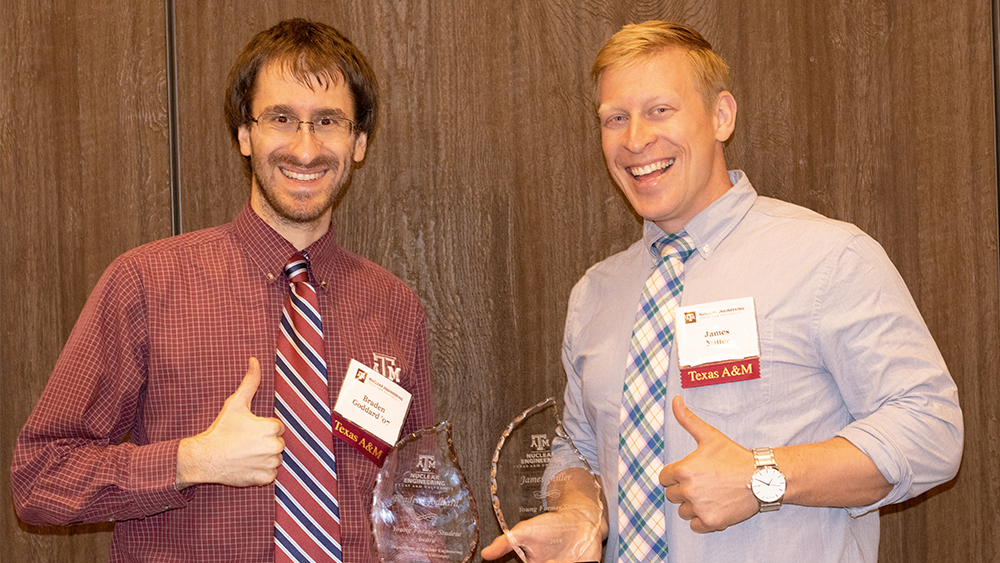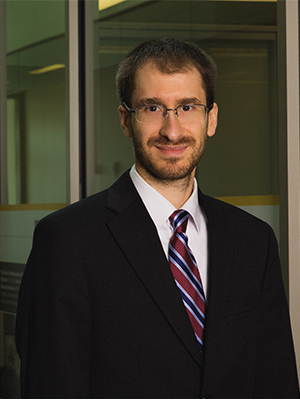
The Texas A&M University Department of Nuclear Engineering’s Young Former Student Award was established in 2018 to recognize and honor former students’ excellence in professional leadership and their contributions to the nuclear field. This award spotlights outstanding former students that have graduated within the last 10 years who have excelled in the nuclear engineering field while displaying Texas A&M’s core values. Dr. Yassin Hassan, department head of nuclear engineering, presented the young former student awards to Dr. Braden Goddard, Dr. James Miller and Dr. Adrienne LaFleur at the department’s awards banquet on Oct. 4.

Braden Goddard ‘07 ‘09 ‘13
Virginia Commonwealth University Department of Mechanical and Nuclear Engineering
Assistant Professor
Favorite Tradition : The nuclear engineering department’s small family feel.
Dr. Braden Goddard is an assistant professor in the Department of Mechanical and Nuclear Engineering at Virginia Commonwealth University (VCU), where he founded the Nuclear Security and Nonproliferation group. Goddard conducts research, mentors graduate and undergraduate students, and teaches courses on the topics of security, nonproliferation and radiation measurements. Goddard oversees three laboratories at Virginia Commonwealth University: The Nuclear Security and Nonproliferation Laboratory, the Radiation Detection and Measurement Laboratory and the Environmental Radionuclide Assay Laboratory. He enjoys working in academia because every day is different, he has the freedom to make his own hours and can do what he thinks his most important.
“Nuclear engineering is far more than power plants and the United States,” said Goddard. “So, while the industry of nuclear power plants may currently be shrinking, other aspects that use nuclear technology are thriving within and outside of the United States.”
Goddard completed his master’s research with Dr. Sean McDeavitt and doctoral degree with Dr. Bill Charlton. “When my Ph.D. committee told me that I passed my defense this meant a lot to me because the people I respected the most now considered me to be a fellow doctor just like them,” said Goddard, who recommends students take fewer hours if possible to focus on getting good grades and learning the material. “This will also allow you to be more involved with American Nuclear Society (ANS), Institute of Nuclear Materials Management (INMM), Women in Nuclear and undergraduate research, thus distinguishing yourself from others,” he said.
Dr. Goddard is an excellent scientist and professor, with a strong work ethic, solid motivation and excellent personal initiative. His diverse background, combined with his dynamic personality and true commitment to our students, make him one of the best assets of VCU’s nuclear engineering program.
 James Miller ‘08 ‘13
James Miller ‘08 ‘13
Los Alamos National Laboratory
Advanced Nuclear Technology Staff Member
Favorite Tradition: Hearing everyone say howdy on campus.
Dr. James Miller is currently a Los Alamos National Laboratory staff member in the Advanced Nuclear Technology group. He has over 12 years of experience in the U.S. Department of Energy complex. As part of the detector development team, he supports the Department of Energy, Department of Homeland Security and Department of State programs on radiation detection, emergency response and nuclear-security related work. He is currently the youngest field deployable diagnostician for the Joint Technical Operations Team providing real-time scientific support to the U.S. Department of Defense and Department of Justice. As a fellow in the Defense Nuclear Nonproliferation’s Office of Research and Development, he expanded his knowledge of nuclear detonation detection, materials production detection and weaponization while working with program managers for the Department of Energy. Miller returned to Los Alamos National Laboratory in 2014 to serve as a postdoctoral research associate under Dr. Mark Abhold while specializing in radiation portal monitoring. Miller enjoys working on unique and complex experiments to answer difficult questions alongside his Los Alamos team.
“There are two skills that no engineer can ever have enough practice with: communication and coding,” said Miller. “You can have the best idea or solution in the world, but if you cannot communicate it effectively, your idea will not matter. Also, I’ve never met an engineer who didn’t want to code better, including Monte Carlo N-Particle source code engineers. So work on both. Those skills will always be in demand.”
Miller holds both his doctoral and master’s degrees in nuclear engineering from Texas A&M where he specialized in nuclear nonproliferation and nuclear forensics while working under Charlton. “I remember learning that whenever I was lost, to stop and consider what the neutron sees,” said Miller. “This has morphed into what does the electron see or the photon or the neutron. But in general, when I get stuck on a difficult physics problem, I think about what I would see if I were hitching a ride on whatever particle I happen to think about.” He participated in INMM, ANS and Alpha Nu Sigma, and coached the Texas A&M Women’s Lacrosse team. Miller was inspired to study nuclear engineering so he could serve his country through the application of math and physics.
Dr. Miller is the shining example of selfless service. Most notable is his long-term commitment to the Mission: Hope organization.
 Adrienne LaFleur ’07 ’11
Adrienne LaFleur ’07 ’11
Los Alamos National Laboratory
Technical Staff Member
Favorite Tradition: Midnight Yell
Dr. Adrienne LaFleur has over 11 years of experience in the development and implementation of advanced nondestructive assay instrumentation for safeguards and nuclear nonproliferation. She is a technical staff member in the Safeguards Science and Technology Group at Los Alamos National Laboratory where she is responsible for several safeguards projects in Japan, South Korea, Ukraine, Kazakhstan and Armenia, as well as projects related to nuclear nonproliferation export controls and nuclear security. Her favorite part of the job is traveling around the world and installing radiation detectors in nuclear facilities to help improve nuclear material accountancy and International Atomic Energy Agency (IAEA) safeguards. LaFleur has written or co-authored several journal articles and a textbook chapter.
“Nonproliferation and nuclear security will continue to be a high priority as countries continue to pursue nuclear power and existing nuclear facilities continue to age and/or undergo decommissioning,” said LaFleur.
LaFleur earned her doctoral degree in nuclear engineering and a certificate in advanced international affairs from Texas A&M in 2011. She worked with Charlton at the Center for Nuclear Security Science and Policy Initiatives. She was an undergraduate research scholar who was involved in the Institute of Nuclear Materials Management and the American Nuclear Society. Her advice for students joining the workforce? “Always be on time and admit when you don’t know something.”
Adrienne LaFleur has distinguished herself as an innovative nuclear engineer who can provide sustainable solutions to globally relevant problems. She is a leader of character who serves society.